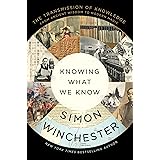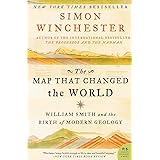
Download the free Kindle app and start reading Kindle books instantly on your smartphone, tablet, or computer - no Kindle device required.
Read instantly on your browser with Kindle for Web.
Using your mobile phone camera - scan the code below and download the Kindle app.

OK
 Audible sample Sample
Audible sample Sample 


Atlantic: Great Sea Battles, Heroic Discoveries, Titanic Storms, and a Vast Ocean of a Million Stories Paperback – Large Print, November 23, 2010
"Variably genial, cautionary, lyrical, admonitory, terrifying, horrifying and inspiring…A lifetime of thought, travel, reading, imagination and memory inform this affecting account." —Kirkus Reviews (starred review)
Blending history and anecdote, geography and reminiscence, science and exposition, New York Times bestselling author Simon Winchester tells the breathtaking saga of the Atlantic Ocean. A gifted storyteller and consummate historian, Winchester sets the great blue sea's epic narrative against the backdrop of mankind's intellectual evolution, telling not only the story of an ocean, but the story of civilization. Fans of Winchester's Krakatoa, The Man Who Loved China, and The Professor and the Madman will love this masterful, penetrating, and resonant tale of humanity finding its way across the ocean of history.
- Print length696 pages
- LanguageEnglish
- PublisherHarper Large Print
- Publication dateNovember 23, 2010
- Dimensions6 x 1.39 x 9 inches
- ISBN-10006200249X
- ISBN-13978-0062002495
Similar items that may deliver to you quickly
Editorial Reviews
Review
“Winchester brings a knowledge as vast and deep as his subject to this history of the Atlantic Ocean.” — Entertainment Weekly
From the Back Cover
Atlantic is a biography of a tremendous space that has been central to the ambitions of explorers, scientists, and warriors, and continues to affect our character, attitudes, and dreams. Poets to potentates, seers to sailors, fishermen to foresters—all have a relationship with this great body of gray and heaving sea.
Winchester chronicles that relationship, making the Atlantic come vividly alive. More than a mere history, Atlantic is an unforgettable journey of unprecedented scope by one of the most gifted writers in the English language.
About the Author
Simon Winchester is the acclaimed author of many books, including The Professor and the Madman, The Men Who United the States, The Map That Changed the World, The Man Who Loved China, A Crack in the Edge of the World, and Krakatoa, all of which were New York Times bestsellers and appeared on numerous best and notable lists. In 2006, Winchester was made an officer of the Order of the British Empire (OBE) by Her Majesty the Queen. He resides in western Massachusetts.
Product details
- Publisher : Harper Large Print; Large type / Large print edition (November 23, 2010)
- Language : English
- Paperback : 696 pages
- ISBN-10 : 006200249X
- ISBN-13 : 978-0062002495
- Item Weight : 1.68 pounds
- Dimensions : 6 x 1.39 x 9 inches
- Best Sellers Rank: #2,027,244 in Books (See Top 100 in Books)
- #642 in South African History
- #863 in Historical Geography
- #1,897 in Expeditions & Discoveries World History (Books)
- Customer Reviews:
About the author

Simon Winchester studied geology at Oxford and has written for Condé Nast Traveler, Smithsonian, and National Geographic. Simon Winchester's many books include The Professor and the Madman ; The Map that Changed the World ; Krakatoa; and A Crack in the Edge of the World. Each of these have both been New York Times bestsellers and appeared on numerous best and notable lists. Mr. Winchester was made Officer of the Order of the British Empire (OBE) by HM The Queen in 2006. He lives in Massachusetts and in the Western Isles of Scotland.
Customer reviews
Customer Reviews, including Product Star Ratings help customers to learn more about the product and decide whether it is the right product for them.
To calculate the overall star rating and percentage breakdown by star, we don’t use a simple average. Instead, our system considers things like how recent a review is and if the reviewer bought the item on Amazon. It also analyzed reviews to verify trustworthiness.
Learn more how customers reviews work on Amazon-
Top reviews
Top reviews from the United States
There was a problem filtering reviews right now. Please try again later.
The structure (allegedly) derives from the famous "All the world's a stage" speech that included the Seven Ages of Man. He adapted this as the seven eras of the Atlantic, a semi-chronological beginning hundreds of millions of years ago with the first separation of Pangea. The Atlantic, we are told, is not eternal or permanent; it came into being and it will vanish.
In an interview Winchester states he chose the Atlantic because that is where modern civilization emerged, that is a civilization based on ideas introduced by Europe - nationhood, representation, elections, science, education, the press, individual rights, etc. (The fact that some nations violated these does not change the narrative.)
We read about unknown heroes - those first tepid explorers who sailed into the terrifying unknown for myriad reasons. We also meet many unsung heroes, men and women who made incredible contributions yet were never given their due. This is grand storytelling, almost poetic in tone. I was slightly put off by a few of the reviews but thankfully I ignored these and was amply rewarded. My grade - A
Simon wrote a good 497 page book. The book read well with no boring parts. Some parts were more interesting than others. He does skip around time wise a lot and in different parts of the Atlantic and lands touching the Atlantic. The reader gets a good history of some of the early people who used the Atlantic, including the Vikings, the Romans, the early Irish, English, Germans, Dutch, French, Spanish, Portuguese, and many more. Also there is the unsubstantiated thought of early people crossing from the West to Europe but evidence of this is not shown.
Explorers Lief Ericson, Columbus, Cabot, and many more are shown and their contributions to Atlantic land exploration.
Some mega millions of years ago when all the continents were together and the birth of the Atlantic is shown as well as the far mega millions of year from now when the Atlantic will cease to exist as the continents will go together again is shown.
Also the vast pollution man has done to the Atlantic with oil spills and dumping of highly radioactive materials is shown as well as fishing sites , for example the Grand Banks cod industry fished out are shown. Also the near extinction of certain whales and some fish species like the Blue Fin Tuna are shown. Also the effects of global warming are shown and the rise of sea levels, glacier meltdown in Greenland and loss of ice in Antarctica are shown. Both human pumping out of greenhouse gases and the cyclical nature of the climate cycles are shown to some limited degree.
Some great sea battles with sailing ships and later steel men of war and gigantic battleships are shown. Huge hurricanes and storms are shown. Some interesting B/W pictures.
I'll give Simon Winchester credit, he wrote a wide sweep of information chapters about the Atlantic and human interaction with it. A little bit on a lot of subjects. There is some jumping around in the timeline of his writing that the reader has to get used to.
A good book with lots of interesting stories of a wide berth of information for readers with different interests. Rated 4 stars
Winchester explains in his preface that he chose to approach the story of the Atlantic using the framework of Shakespeare's seven stages of man from As You Like It. This was a masterstroke because it allowed Winchester to cover his monumental subject in a variety of ways, so that Atlantic is part memoir, part history, part scientific study. I enjoyed every part but found the sections in which Winchester deals with his own life story the most interesting, particularly the story of his first voyage across the Atlantic in 1963 on board one of the old liners. It was also fascinating to untangle some of the intriguing links Winchester details, such as how the state of Israel's founding depended on part on Atlantic connections. The final chapter, in which Winchester describes how climate changes are affecting the Atlantic and other oceans, made for sobering reading.
While Atlantic may seem to have little in common with some of Winchester's other works such as The Professor and the Madman or The Meaning of Everything, they are linked by his close attention to detail and his ability to tell an intriguing anecdote as well as his clear command of language. We are fortunate indeed to have so fine a writer with so many varied interests among us!
Top reviews from other countries
There's the story of European and North American commerce, military conquests, undersea communications, and more here, all written in Winchester's readable style. The latter part of the book looks at the life within the Atlantic: the exploration of the depths and the exploitation of the ocean itself by man. There's mention of the effects of global warming and pollution, and the way we all depend on the Atlantic for our water and more. There's some lovely facts here that I didn't know before, covering all manner of subjects and interest areas.
More than anything, this is an account of an ocean and the humans who interact with it over a long period of time. Atlantic has been called a love-letter to the ocean, but I think it's more of an exploration of a natural phenomenon that has shaped our lives from our earliest ancestors, following through the various civilizations that have used the ocean for various means. It's informative, certainly, but you'd expect that from Winchester. It's well written, but again you'd expect that. And it's going to raise your knowledge level and your curiosity, and that certainly is what I expect from Winchester. I really enjoyed reading Atlantic and it's strongly recommended for many different reasons.
Simon Winchester schrijft in een zeer toegankelijke taal wat wel knap is voor sommige anders saaie items.
But he paints on a wider canvas to describe the importance of the Atlantic over the years - an ocean that with today's air travel does not have a high profile. For example parliamentary democracy as it is understood today was very much an Atlantic creation. No such institutions arose in Russia or China or Greece. The Icelandic Rock of Laws set the pattern for governance of the rest of the world, mimicked by the Faroe Islands, Norway, Sweden, Denmark and Britain.
He approaches the Atlantic from all angles, from its early exploration to pirates and the slave trade; from sea battles through the ages to commerce; from the laying of the transatlantic cable and air routes across the ocean to climate change, ocean currents and receding ice cap.
The question of what motivated men to make the dangerous voyage into the Atlantic before America was "discovered" is answered by fish and whales. He makes a convincing case that the Norsemen created settlements in Newfoundland and Labrador between 975 and 1020 AD. The allure of fish, and specifically cod, drew the Vikings and the Basques as well as John Cabot who named Newfoundland before the imperial claims made by Christopher Colombus in 1492.
The technical tribulations of the USS Niagra and HMS Agamemnon in laying 2,500 miles of transatlantic cable in 1857 is ascribed as the most ambitious construction project ever envisaged in the world. The visionary and financier behind the project was Cyrus Field. After only 15 days the cable succumbed to some unknown submarine malady and no further cable was laid until Brunel's Great Eastern in 1866. By 1900 there were 15 cables but then in 1901 Marconi successfully sent the first radio signal across the Atlantic. The "distance in time" across the Atlantic rapidly diminished.
The immense research and colourful stories makes it another of Winchester's compelling books.










